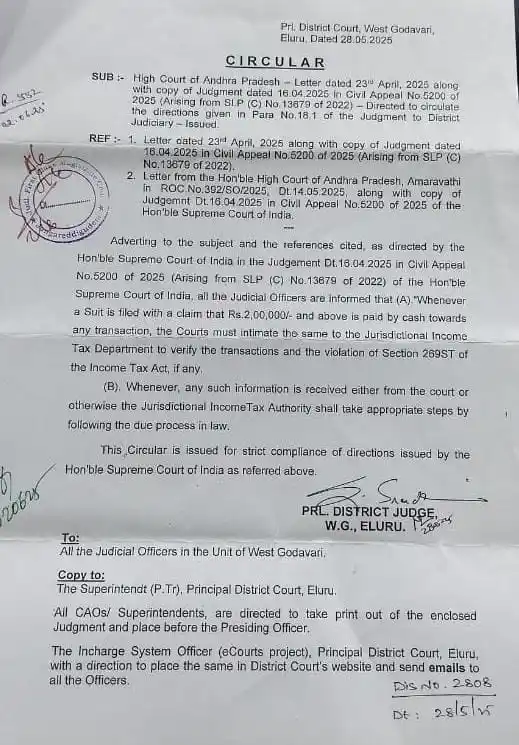
Statutory HUB
81 subscribers
About Statutory HUB
🌟 Welcome to Statutory HUB! 🌟 Your trusted source for daily updates on Income Tax, GST, RERA, FEMA, FERA, RBI, SEBI, Companies Act, LLP, and more. 🔍 What We Offer: Latest legal and regulatory insights Expert analysis and compliance updates Simplified explanations of complex laws Timely notifications to keep you informed 📚 Stay Ahead with Knowledge Empowering professionals, businesses, and individuals with clarity and understanding in the ever-evolving legal landscape. ⚖️ Follow us to stay compliant, informed, and empowered!
Similar Channels
Swipe to see more
Posts

🚨 Major Capital Gains Tax Changes in India! 🚨 The Income Tax Bill, 2025 revamps Capital Gains Tax rules like never before! If you invest in stocks, mutual funds, real estate, startups, or crypto—this WILL impact you! 🔹 Simplified Holding Periods 🔹 New Tax Rates 🔹 Debt Mutual Funds Lose Indexation 🔹 Real Estate Gains Changes 🔹 Crypto & Foreign Investments Hit Hard Everything you must know in 2025 👇 1. Holding Periods for Long-Term Capital Gains Standardized 📅 Earlier, different investments had different holding periods to qualify as long-term capital gains (LTCG). ✅ New Standardized Holding Periods (2025 onwards): 🔹 Listed Stocks & Equity Mutual Funds ➟ 1 year 🔹 Debt Mutual Funds & Bonds ➟ 2 years (earlier 3 years) 🔹 Real Estate & Land ➟ 3 years 🔹 Unlisted Shares, Startups, & Private Equity ➟ 2 years (earlier 3 years) 📌 Impact: ➟ More clarity on short-term vs long-term taxation. ➟ Debt mutual funds become more attractive with shorter LTCG period. ➟ Property flipping (buying & selling quickly) will be less tax-friendly. 🚀 Example: If you bought a debt mutual fund in 2023 and sell in 2025, you’ll pay LTCG tax in just 2 years instead of 3! 2. New Capital Gains Tax Rates 💰 🔹 Earlier Tax Rates: ➟ Stocks & Equity Mutual Funds ➟ 10% LTCG (if gains > ₹1 lakh) ➟ Debt Mutual Funds ➟ 20% after indexation ➟ Real Estate ➟ 20% after indexation 🔹 New Tax Rates (2025 onwards): ✅ Stocks & Equity MFs ➟ No change (10% LTCG), but STCG taxed at flat 15%! ✅ Debt MFs ➟ No more indexation, straight 20% tax! ✅ Unlisted Shares, Startups, & PE ➟ 20% flat tax (earlier varied) 📌 Impact: ➟ Debt mutual funds become LESS attractive compared to traditional FDs. ➟ Equity mutual fund short-term gains will now have a flat tax rate! 🚀 Example: If you sell a debt mutual fund after 2 years, you now pay 20% tax—even if inflation is high! 3. Debt Mutual Funds Lose Indexation Benefits 📊 🔹 Earlier: ➟ Debt mutual funds had indexation benefits, meaning your purchase price was adjusted for inflation before tax was calculated. 🔹 Now (2025 onwards): ✅ Debt funds LOSE indexation benefits. ✅ Only Real Estate & Gold STILL get indexation benefits. 📌 Impact: ➟ Debt funds now get taxed like regular income. ➟ Gold & real estate become more tax-efficient investments. 🚀 Example: Before: If inflation was 7% & your debt fund grew 9%, your taxable profit was only 2%! Now: Your entire 9% growth is taxable! 4. Market-Linked Debentures (MLDs) Lose Tax Advantage 📑 🔹 Earlier: ➟ MLDs were taxed as LTCG (10%) after 1 year. 🔹 Now (2025 onwards): ✅ MLDs will be taxed as Short-Term Capital Gains (STCG) at slab rates, regardless of holding period! ✅ No LTCG benefit on MLDs anymore. 📌 Impact: ➟ HNI investors using MLDs for tax efficiency will be hit hard. ➟ Direct bonds or corporate FDs might become better alternatives. 🚀 Example: Before: If you invested ₹10L in MLDs, after 1 year, LTCG tax was 10%. Now: You pay 30%+ if you’re in the highest tax slab! 5. Real Estate Gains Taxation Updated 🏠 🔹 New Rules: ✅ Holding period fixed at 3 years for long-term gains. ✅ Tax-free reinvestment under Sec 54/54F now capped. ✅ Real estate held via LLPs or foreign structures will be taxed more strictly. 📌 Impact: ➟ Property flipping (short-term selling) will be taxed more. ➟ You can’t keep rolling gains into new properties to avoid taxes forever! 🚀 Example: Before: You could sell a property, reinvest, and keep avoiding tax. Now: There’s a CAP on tax-free reinvestments! 6. Crypto & Foreign Investments Taxed More 🌍🚀 🔹 Crypto & Foreign Investment Changes: ✅ Crypto gains taxed at FLAT 30% (long-term or short-term). ✅ No offset against other losses. ✅ Higher tracking of offshore crypto holdings. ✅ Foreign capital gains face stricter taxation. 📌 Impact: ➟ Crypto traders & offshore investors need better tax strategies. 🚀 Example: If an NRI sells Apple shares, India may now tax the capital gains! 💡 Final Takeaways: ✔ Debt & MLDs lose tax benefits. ✔ Equity & real estate taxation mostly unchanged. ✔ Foreign gains & crypto under tighter scrutiny. ✔ NRIs must disclose foreign capital gains properly.

Kind Attention ✅The utility to check section of Income Tax Act, 1961 vis-a-vis corresponding Clause of New Income Tax Bill is now live. ✅ The utility can be checked at: https://incometaxindia.gov.in/Pages/utility-income-tax-act-vis-a-vis-bill.aspx ✅ Section to Section mapping as per Income Tax Act,1961 and Section number as per New Income Tax Bill can be navigated at: https://incometaxindia.gov.in/Documents/income-tax-bill-2025/new-bill-2025-navigator.pdf

**Introducing NPS Vatsalya – Secure Your Child’s Future & Save Taxes!* 🔹 Long-term, Secure Investment – Specially designed for children's retirement planning. 🔹 Affordable & Flexible – Start with just ₹1,000, no upper limit on contributions. 🔹 Tax Benefits Under New Tax Regime – Deduction up to ₹50,000 under Section 80CCD(1B) (Finance Bill 2025). 🔹 Seamless Transition – Converts into a standard NPS Tier 1 account at age 18. 🔹 High Returns – Earn 9.5% to 10% annual interest for wealth growth. 🔹 Partial Withdrawals & Exit Options – Flexibility when needed, with certain conditions. 🔹 Easy Online Registration – Open your account hassle-free via eNPS website. 📢 Secure your child’s financial future today! 💡💰

*Correction statements (Revised TDS Returns) for FY 2007-08 to 2018-19 shall be accepted only up to 31st March 2025.* As per the recent amendment to Section 200(3) of the Income Tax Act, no correction statement (Revised TDS Return) shall be filed after the expiry of six years from the end of the relevant financial year.

*Extension of due date for filing of Form No. 56F under the Income-tax Act, 1961*
















